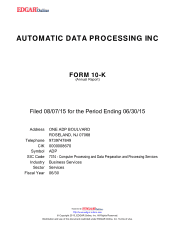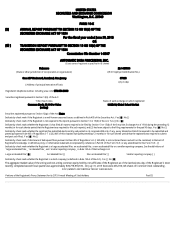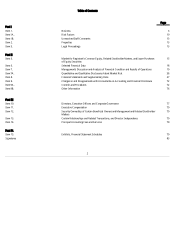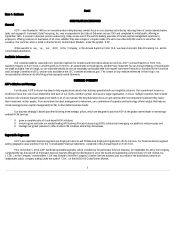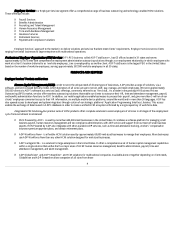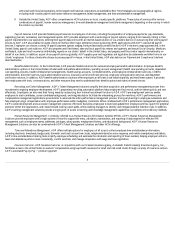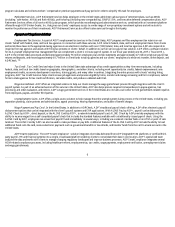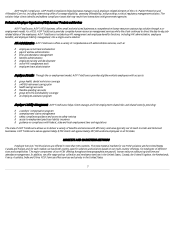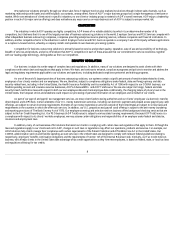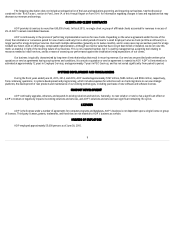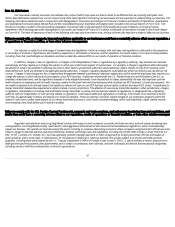ADP 2014 Annual Report Download - page 11
Download and view the complete annual report
Please find page 11 of the 2014 ADP annual report below. You can navigate through the pages in the report by either clicking on the pages listed below, or by using the keyword search tool below to find specific information within the annual report.
Item 1A. Risk Factors
Our businesses routinely encounter and address risks, some of which may cause our future results to be different than we currently anticipate. Risk
factors described below represent our current view of some of the most important risks facing our businesses and are important to understanding our business. The
following information should be read in conjunction with Management’s Discussion and Analysis of Financial Condition and Results of Operations, Quantitative
and Qualitative Disclosures About Market Risk and the consolidated financial statements and related notes included in this Annual Report on Form 10-K. This
discussion includes a number of forward-looking statements. You should refer to the description of the qualifications and limitations on forward-looking
statements in the first paragraph under Management’s Discussion and Analysis of F inancial Condition and Results of Operations included in this Annual Report
on Form 10-K. The level of importance of each of the following risks may vary from time to time, and any of these risks may have a material effect on our business.
Failure to comply with, or changes in, laws and regulations applicable to our businesses could have a materially adverse effect on our reputation, results
of operations or financial condition, or have other adverse consequences
Our business is subject to a wide range of complex laws and regulations. Failure to comply with such laws and regulations could result in the suspension
or revocation of licenses or registrations, the limitation, suspension or termination of services, and the imposition of consent orders or civil and criminal penalties,
including fines, that could damage our reputation and have a materially adverse effect on our results of operation or financial condition.
In addition, changes in laws or regulations, or changes in the interpretation of laws or regulations by a regulatory authority, may decrease our revenues
and earnings and may require us to change the manner in which we conduct some aspects of our business. For example, a change in regulations either decreasing
the amount of taxes to be withheld or allowing less time to remit taxes to government authorities would adversely impact interest income from investing client
funds before such funds are remitted to the applicable taxing authorities. Changes in taxation regulations could adversely affect our effective tax rate and our net
income. Changes in laws that govern the co-employment arrangement between a professional employer organization and its worksite employees may require us to
change the manner in which we conduct some aspects of our PEO business. Healthcare reform under the U.S. Patient Protection and Affordable Care Act, as
amended, related state laws, and the regulations adopted or to be adopted thereunder, have the potential to impact substantially the way that employers provide
health insurance to employees and the health insurance market for the small and mid-sized businesses that constitute our PEO business’s clients and prospects. We
are unable to determine the ultimate impact that healthcare reform will have on our PEO business and our ability to attract and retain PEO clients. A mendments to
money transmitter statutes have required us to obtain licenses in some jurisdictions. The adoption of new money transmitter statutes in other jurisdictions, changes
in regulators’ interpretation of existing state and federal money transmitter or money services business statutes or regulations, or disagreement by a regulatory
authority with our interpretation of such existing statutes or regulations, could require additional registration or licensing, limit certain of our business activities
until they are appropriately licensed, and expose us to financial penalties. These occurrences could also require changes to our compliance programs and to the
manner in which we conduct some aspects of our money movement business or client funds investment strategy, which could adversely impact interest income
from investing client funds before such funds are remitted.
Failure to comply with the U.S. Foreign Corrupt Practices Act, economic and trade sanctions, and anti-money laundering laws and regulations, and
similar laws could have a materially adverse effect on our reputation, results of operations or financial condition, or have other adverse consequences
Regulators worldwide are exercising heightened scrutiny with respect to anti-corruption, economic and trade sanctions, and anti-money laundering laws
and regulations. Such heightened scrutiny could result in more aggressive enforcement of such laws and more burdensome regulations, which could adversely
impact our business. We operate our business around the world, including in numerous developing economies where companies and government officials are more
likely to engage in business practices that are prohibited by domestic and foreign laws and regulations, including the United States Foreign Corrupt Practices Act
(the “FCPA”) and the U.K . Bribery Act. Such laws generally prohibit improper payments or offers of payments to foreign government officials and leaders of
political parties, and in some cases, to other persons, for the purpose of obtaining or retaining business. We are also subject to economic and trade sanctions
programs, including those administered by the U.S. Treasury Department’s Office of Foreign Assets Control (“OFAC”), which prohibit or restrict transactions or
dealings with specified countries, their governments, and in certain circumstances, their nationals, and with individuals and entities that are specially designated,
including narcotics traffickers and terrorists or terrorist organizations,
10

